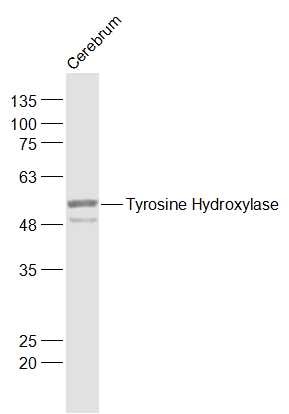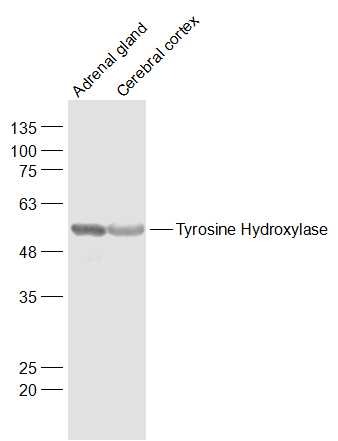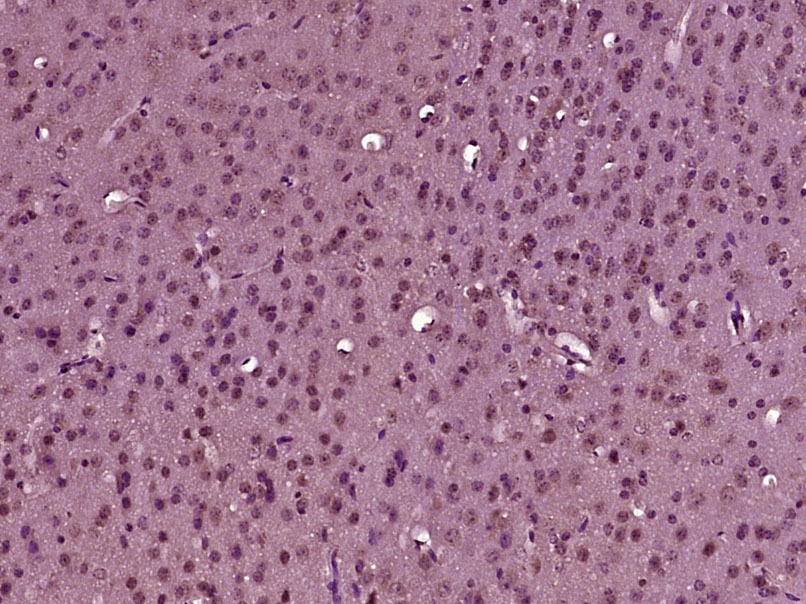Shopping Cart
Remove All Your shopping cart is currently empty
Your shopping cart is currently empty
Anti-Tyrosine Hydroxylase Polyclonal Antibody 2 is a Rabbit antibody targeting Tyrosine Hydroxylase. Anti-Tyrosine Hydroxylase Polyclonal Antibody 2 can be used in IF,IHC-Fr,IHC-P,WB.
| Pack Size | Price | USA Warehouse | Global Warehouse | Quantity |
|---|---|---|---|---|
| 50 μL | $221 | 7-10 days | 7-10 days | |
| 100 μL | $373 | 7-10 days | 7-10 days | |
| 200 μL | $529 | 7-10 days | 7-10 days |
| Description | Anti-Tyrosine Hydroxylase Polyclonal Antibody 2 is a Rabbit antibody targeting Tyrosine Hydroxylase. Anti-Tyrosine Hydroxylase Polyclonal Antibody 2 can be used in IF,IHC-Fr,IHC-P,WB. |
| Synonyms | tyrosine hydroxylase |
| Ig Type | IgG |
| Reactivity | Mouse,Rat (predicted:Human) |
| Verified Activity | 1. Sample: Cerebrum (Mouse) Lysate at 40 μg Primary: Anti-Tyrosine Hydroxylase (TMAB-01925) at 1/1000 dilution Secondary: IRDye800CW Goat Anti-Rabbit IgG at 1/20000 dilution Predicted band size: 60 kDa Observed band size: 56 kDa 2. Sample: Adrenal gland (Rat) Lysate at 40 μg Cerebral cortex (Rat) Lysate at 40 μg Primary: Anti-Tyrosine Hydroxylase (TMAB-01925) at 1/1000 dilution Secondary: IRDye800CW Goat Anti-Rabbit IgG at 1/20000 dilution Predicted band size: 60 kDa Observed band size: 56 kDa 3. Paraformaldehyde-fixed, paraffin embedded (Mouse brain); Antigen retrieval by boiling in sodium citrate buffer (pH6.0) for 15 min; Block endogenous peroxidase by 3% hydrogen peroxide for 20 min; Blocking buffer (normal goat serum) at 37°C for 30 min; Antibody incubation with (Tyrosine Hydroxylase) Polyclonal Antibody, Unconjugated (TMAB-01925) at 1:400 overnight at 4°C, followed by operating according to SP Kit (Rabbit) instructionsand DAB staining.    |
| Application | |
| Recommended Dose | WB: 1:500-2000; IHC-P: 1:100-500; IHC-Fr: 1:100-500; IF: 1:100-500 |
| Antibody Type | Polyclonal |
| Host Species | Rabbit |
| Subcellular Localization | Mainly expressed in the brain and adrenal glands. |
| Tissue Specificity | Mainly expressed in the brain and adrenal glands. |
| Construction | Polyclonal Antibody |
| Purification | Protein A purified |
| Appearance | Liquid |
| Formulation | 0.01M TBS (pH7.4) with 1% BSA, 0.02% Proclin300 and 50% Glycerol. |
| Concentration | 1 mg/mL |
| Research Background | The protein encoded by this gene is involved in the conversion of tyrosine to dopamine. It is the rate-limiting enzyme in the synthesis of catecholamines, hence plays a key role in the physiology of adrenergic neurons. Mutations in this gene have been associated with autosomal recessive Segawa syndrome. Alternatively spliced transcript variants encoding different isoforms have been noted for this gene. [provided by RefSeq, Jul 2008] |
| Immunogen | KLH conjugated synthetic peptide: human TH |
| Antigen Species | Human |
| Gene Name | TH |
| Gene ID | |
| Protein Name | Tyrosine 3-monooxygenase |
| Uniprot ID | |
| Biology Area | Noradrenaline,Dopamine,Soma marker,Hypoxia,Hormone biosynthesis,Response to hypoxia,Hormone biosynthesis |
| Function | Plays an important role in the physiology of adrenergic neurons. |
| Molecular Weight | Theoretical: 60 kDa. |
| Stability & Storage | Store at -20°C or -80°C for 12 months. Avoid repeated freeze-thaw cycles. |
| Transport | Shipping with blue ice. |
| Size | Quantity | Unit Price | Amount | Operation |
|---|

Copyright © 2015-2026 TargetMol Chemicals Inc. All Rights Reserved.